Health Management Journal: Challenges in Nursing Leadership
VerifiedAdded on 2022/09/30
|14
|4386
|307
Journal and Reflective Writing
AI Summary
This health management journal chronicles a team leader's experiences in a healthcare setting, focusing on the challenges of managing a team of nurses and student trainees. The journal entries, spanning several weeks, detail specific incidents such as medication errors, communication breakdowns, and interpersonal conflicts among team members. The author utilizes Gibbs' reflective cycle to analyze each situation, describing the events, expressing feelings, evaluating outcomes, drawing conclusions, and formulating action plans. The journal highlights the importance of effective communication, teamwork, and conflict resolution in healthcare, as well as the significance of mentorship and support for student nurses. The author reflects on their role in fostering a positive work environment, promoting discipline, and ensuring patient safety. The journal also addresses issues of horizontal violence and discrimination within the nursing team, emphasizing the need for equitable treatment and professional development. The author documents the steps taken to address each challenge, including meetings, discussions, and policy implementations. The journal serves as a reflective tool for improving leadership skills and promoting a culture of continuous learning within the healthcare team.
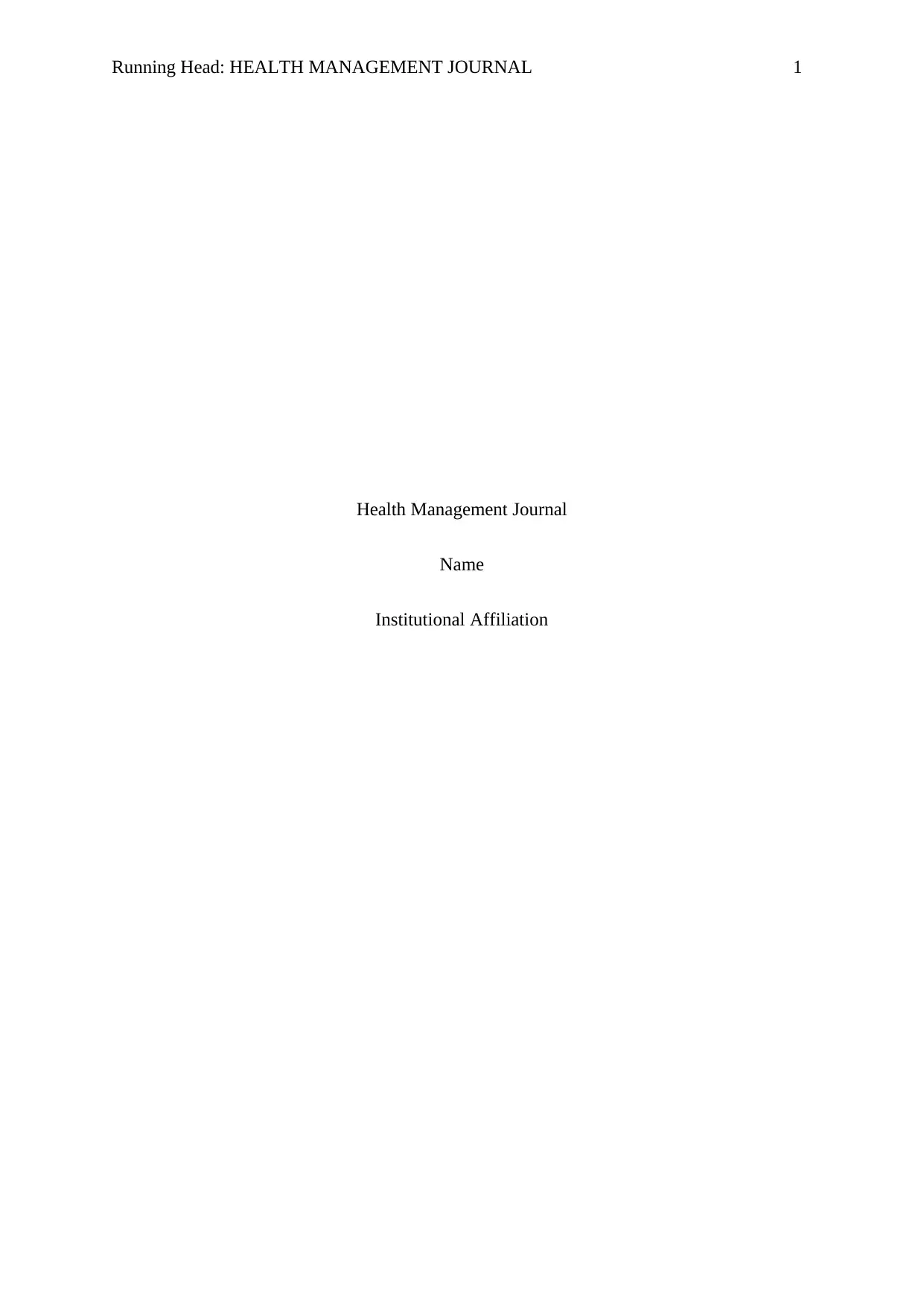
Running Head: HEALTH MANAGEMENT JOURNAL 1
Health Management Journal
Name
Institutional Affiliation
Health Management Journal
Name
Institutional Affiliation
Paraphrase This Document
Need a fresh take? Get an instant paraphrase of this document with our AI Paraphraser
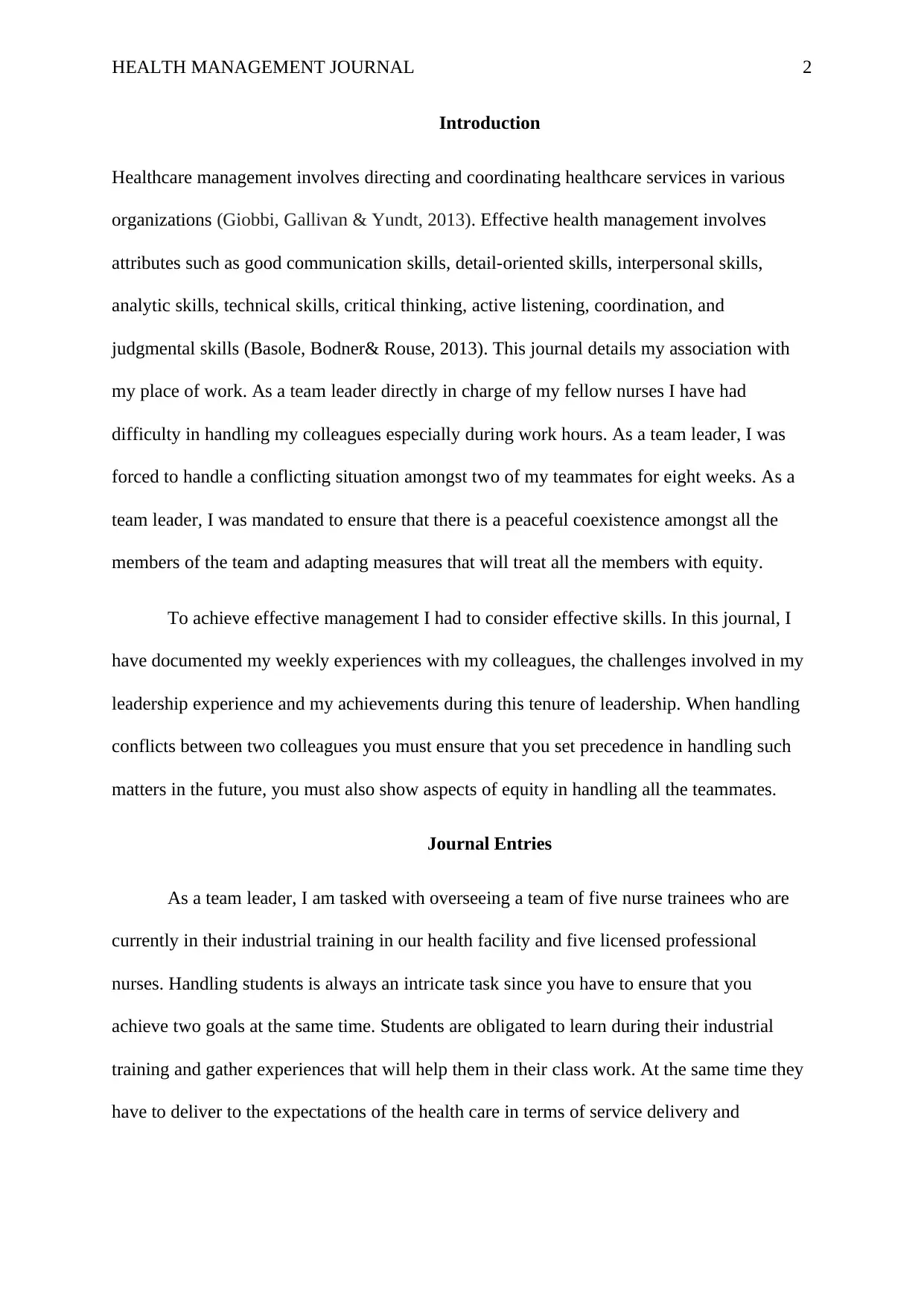
HEALTH MANAGEMENT JOURNAL 2
Introduction
Healthcare management involves directing and coordinating healthcare services in various
organizations (Giobbi, Gallivan & Yundt, 2013). Effective health management involves
attributes such as good communication skills, detail-oriented skills, interpersonal skills,
analytic skills, technical skills, critical thinking, active listening, coordination, and
judgmental skills (Basole, Bodner& Rouse, 2013). This journal details my association with
my place of work. As a team leader directly in charge of my fellow nurses I have had
difficulty in handling my colleagues especially during work hours. As a team leader, I was
forced to handle a conflicting situation amongst two of my teammates for eight weeks. As a
team leader, I was mandated to ensure that there is a peaceful coexistence amongst all the
members of the team and adapting measures that will treat all the members with equity.
To achieve effective management I had to consider effective skills. In this journal, I
have documented my weekly experiences with my colleagues, the challenges involved in my
leadership experience and my achievements during this tenure of leadership. When handling
conflicts between two colleagues you must ensure that you set precedence in handling such
matters in the future, you must also show aspects of equity in handling all the teammates.
Journal Entries
As a team leader, I am tasked with overseeing a team of five nurse trainees who are
currently in their industrial training in our health facility and five licensed professional
nurses. Handling students is always an intricate task since you have to ensure that you
achieve two goals at the same time. Students are obligated to learn during their industrial
training and gather experiences that will help them in their class work. At the same time they
have to deliver to the expectations of the health care in terms of service delivery and
Introduction
Healthcare management involves directing and coordinating healthcare services in various
organizations (Giobbi, Gallivan & Yundt, 2013). Effective health management involves
attributes such as good communication skills, detail-oriented skills, interpersonal skills,
analytic skills, technical skills, critical thinking, active listening, coordination, and
judgmental skills (Basole, Bodner& Rouse, 2013). This journal details my association with
my place of work. As a team leader directly in charge of my fellow nurses I have had
difficulty in handling my colleagues especially during work hours. As a team leader, I was
forced to handle a conflicting situation amongst two of my teammates for eight weeks. As a
team leader, I was mandated to ensure that there is a peaceful coexistence amongst all the
members of the team and adapting measures that will treat all the members with equity.
To achieve effective management I had to consider effective skills. In this journal, I
have documented my weekly experiences with my colleagues, the challenges involved in my
leadership experience and my achievements during this tenure of leadership. When handling
conflicts between two colleagues you must ensure that you set precedence in handling such
matters in the future, you must also show aspects of equity in handling all the teammates.
Journal Entries
As a team leader, I am tasked with overseeing a team of five nurse trainees who are
currently in their industrial training in our health facility and five licensed professional
nurses. Handling students is always an intricate task since you have to ensure that you
achieve two goals at the same time. Students are obligated to learn during their industrial
training and gather experiences that will help them in their class work. At the same time they
have to deliver to the expectations of the health care in terms of service delivery and
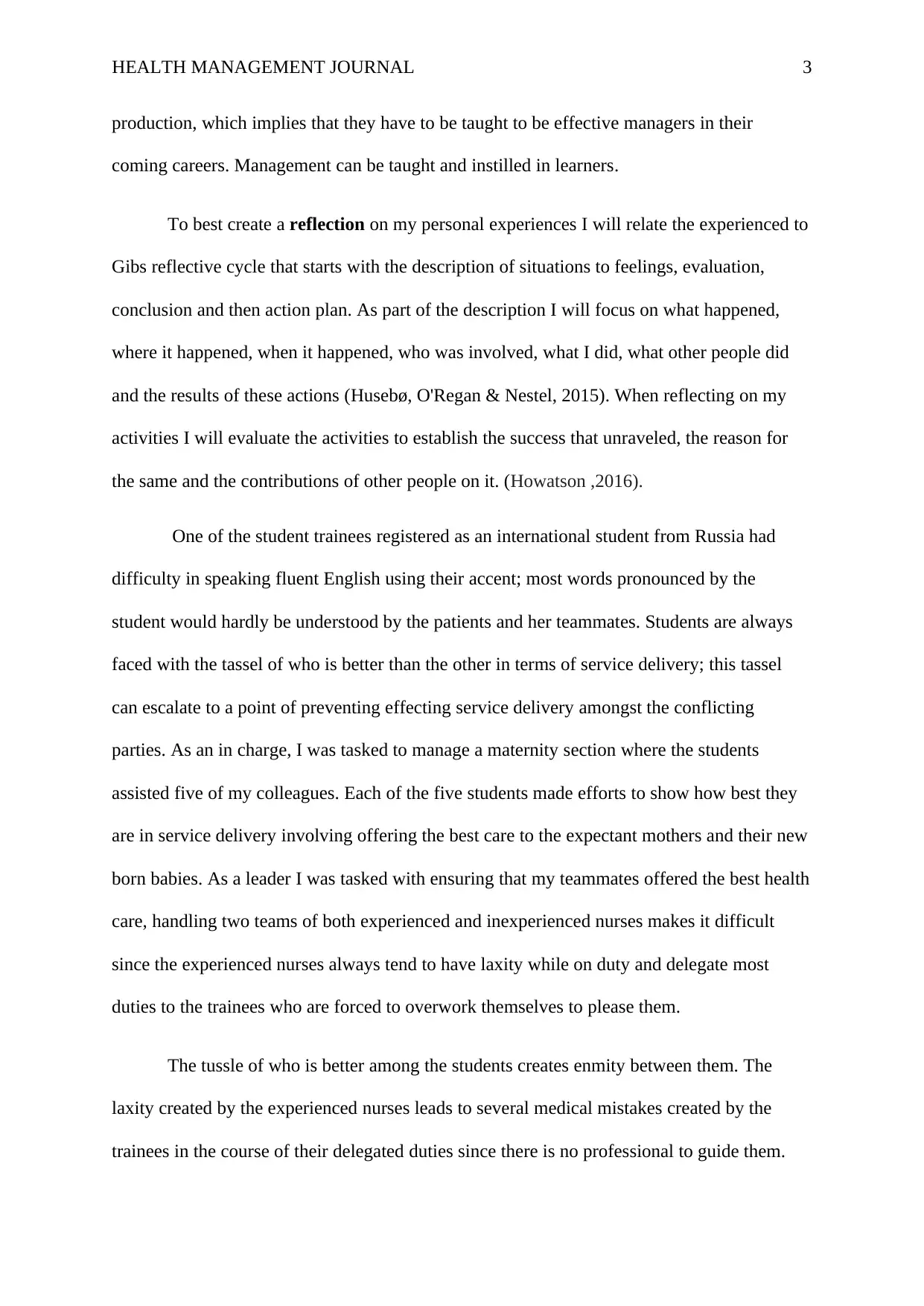
HEALTH MANAGEMENT JOURNAL 3
production, which implies that they have to be taught to be effective managers in their
coming careers. Management can be taught and instilled in learners.
To best create a reflection on my personal experiences I will relate the experienced to
Gibs reflective cycle that starts with the description of situations to feelings, evaluation,
conclusion and then action plan. As part of the description I will focus on what happened,
where it happened, when it happened, who was involved, what I did, what other people did
and the results of these actions (Husebø, O'Regan & Nestel, 2015). When reflecting on my
activities I will evaluate the activities to establish the success that unraveled, the reason for
the same and the contributions of other people on it. (Howatson ,2016).
One of the student trainees registered as an international student from Russia had
difficulty in speaking fluent English using their accent; most words pronounced by the
student would hardly be understood by the patients and her teammates. Students are always
faced with the tassel of who is better than the other in terms of service delivery; this tassel
can escalate to a point of preventing effecting service delivery amongst the conflicting
parties. As an in charge, I was tasked to manage a maternity section where the students
assisted five of my colleagues. Each of the five students made efforts to show how best they
are in service delivery involving offering the best care to the expectant mothers and their new
born babies. As a leader I was tasked with ensuring that my teammates offered the best health
care, handling two teams of both experienced and inexperienced nurses makes it difficult
since the experienced nurses always tend to have laxity while on duty and delegate most
duties to the trainees who are forced to overwork themselves to please them.
The tussle of who is better among the students creates enmity between them. The
laxity created by the experienced nurses leads to several medical mistakes created by the
trainees in the course of their delegated duties since there is no professional to guide them.
production, which implies that they have to be taught to be effective managers in their
coming careers. Management can be taught and instilled in learners.
To best create a reflection on my personal experiences I will relate the experienced to
Gibs reflective cycle that starts with the description of situations to feelings, evaluation,
conclusion and then action plan. As part of the description I will focus on what happened,
where it happened, when it happened, who was involved, what I did, what other people did
and the results of these actions (Husebø, O'Regan & Nestel, 2015). When reflecting on my
activities I will evaluate the activities to establish the success that unraveled, the reason for
the same and the contributions of other people on it. (Howatson ,2016).
One of the student trainees registered as an international student from Russia had
difficulty in speaking fluent English using their accent; most words pronounced by the
student would hardly be understood by the patients and her teammates. Students are always
faced with the tassel of who is better than the other in terms of service delivery; this tassel
can escalate to a point of preventing effecting service delivery amongst the conflicting
parties. As an in charge, I was tasked to manage a maternity section where the students
assisted five of my colleagues. Each of the five students made efforts to show how best they
are in service delivery involving offering the best care to the expectant mothers and their new
born babies. As a leader I was tasked with ensuring that my teammates offered the best health
care, handling two teams of both experienced and inexperienced nurses makes it difficult
since the experienced nurses always tend to have laxity while on duty and delegate most
duties to the trainees who are forced to overwork themselves to please them.
The tussle of who is better among the students creates enmity between them. The
laxity created by the experienced nurses leads to several medical mistakes created by the
trainees in the course of their delegated duties since there is no professional to guide them.
⊘ This is a preview!⊘
Do you want full access?
Subscribe today to unlock all pages.

Trusted by 1+ million students worldwide
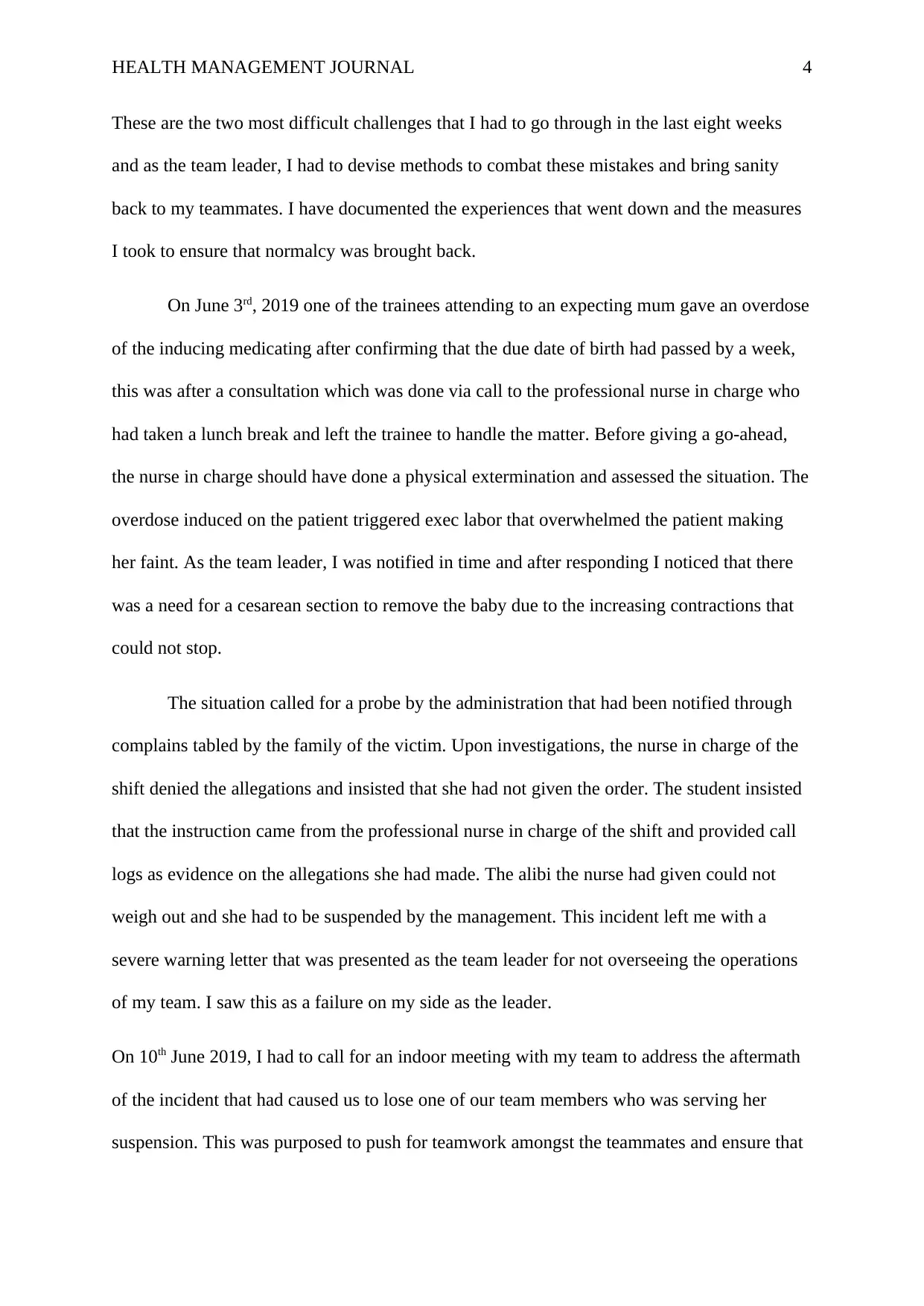
HEALTH MANAGEMENT JOURNAL 4
These are the two most difficult challenges that I had to go through in the last eight weeks
and as the team leader, I had to devise methods to combat these mistakes and bring sanity
back to my teammates. I have documented the experiences that went down and the measures
I took to ensure that normalcy was brought back.
On June 3rd, 2019 one of the trainees attending to an expecting mum gave an overdose
of the inducing medicating after confirming that the due date of birth had passed by a week,
this was after a consultation which was done via call to the professional nurse in charge who
had taken a lunch break and left the trainee to handle the matter. Before giving a go-ahead,
the nurse in charge should have done a physical extermination and assessed the situation. The
overdose induced on the patient triggered exec labor that overwhelmed the patient making
her faint. As the team leader, I was notified in time and after responding I noticed that there
was a need for a cesarean section to remove the baby due to the increasing contractions that
could not stop.
The situation called for a probe by the administration that had been notified through
complains tabled by the family of the victim. Upon investigations, the nurse in charge of the
shift denied the allegations and insisted that she had not given the order. The student insisted
that the instruction came from the professional nurse in charge of the shift and provided call
logs as evidence on the allegations she had made. The alibi the nurse had given could not
weigh out and she had to be suspended by the management. This incident left me with a
severe warning letter that was presented as the team leader for not overseeing the operations
of my team. I saw this as a failure on my side as the leader.
On 10th June 2019, I had to call for an indoor meeting with my team to address the aftermath
of the incident that had caused us to lose one of our team members who was serving her
suspension. This was purposed to push for teamwork amongst the teammates and ensure that
These are the two most difficult challenges that I had to go through in the last eight weeks
and as the team leader, I had to devise methods to combat these mistakes and bring sanity
back to my teammates. I have documented the experiences that went down and the measures
I took to ensure that normalcy was brought back.
On June 3rd, 2019 one of the trainees attending to an expecting mum gave an overdose
of the inducing medicating after confirming that the due date of birth had passed by a week,
this was after a consultation which was done via call to the professional nurse in charge who
had taken a lunch break and left the trainee to handle the matter. Before giving a go-ahead,
the nurse in charge should have done a physical extermination and assessed the situation. The
overdose induced on the patient triggered exec labor that overwhelmed the patient making
her faint. As the team leader, I was notified in time and after responding I noticed that there
was a need for a cesarean section to remove the baby due to the increasing contractions that
could not stop.
The situation called for a probe by the administration that had been notified through
complains tabled by the family of the victim. Upon investigations, the nurse in charge of the
shift denied the allegations and insisted that she had not given the order. The student insisted
that the instruction came from the professional nurse in charge of the shift and provided call
logs as evidence on the allegations she had made. The alibi the nurse had given could not
weigh out and she had to be suspended by the management. This incident left me with a
severe warning letter that was presented as the team leader for not overseeing the operations
of my team. I saw this as a failure on my side as the leader.
On 10th June 2019, I had to call for an indoor meeting with my team to address the aftermath
of the incident that had caused us to lose one of our team members who was serving her
suspension. This was purposed to push for teamwork amongst the teammates and ensure that
Paraphrase This Document
Need a fresh take? Get an instant paraphrase of this document with our AI Paraphraser
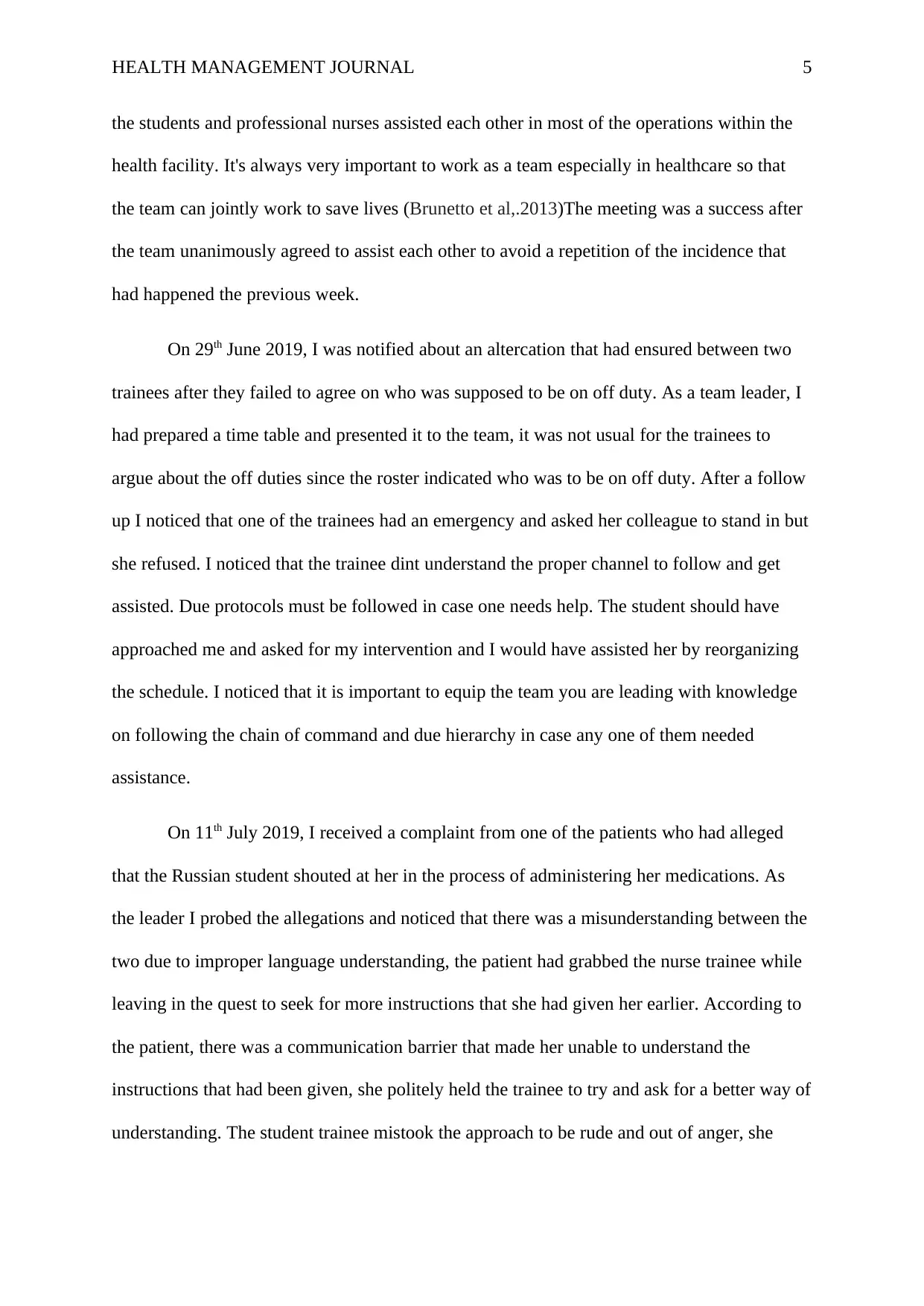
HEALTH MANAGEMENT JOURNAL 5
the students and professional nurses assisted each other in most of the operations within the
health facility. It's always very important to work as a team especially in healthcare so that
the team can jointly work to save lives (Brunetto et al,.2013)The meeting was a success after
the team unanimously agreed to assist each other to avoid a repetition of the incidence that
had happened the previous week.
On 29th June 2019, I was notified about an altercation that had ensured between two
trainees after they failed to agree on who was supposed to be on off duty. As a team leader, I
had prepared a time table and presented it to the team, it was not usual for the trainees to
argue about the off duties since the roster indicated who was to be on off duty. After a follow
up I noticed that one of the trainees had an emergency and asked her colleague to stand in but
she refused. I noticed that the trainee dint understand the proper channel to follow and get
assisted. Due protocols must be followed in case one needs help. The student should have
approached me and asked for my intervention and I would have assisted her by reorganizing
the schedule. I noticed that it is important to equip the team you are leading with knowledge
on following the chain of command and due hierarchy in case any one of them needed
assistance.
On 11th July 2019, I received a complaint from one of the patients who had alleged
that the Russian student shouted at her in the process of administering her medications. As
the leader I probed the allegations and noticed that there was a misunderstanding between the
two due to improper language understanding, the patient had grabbed the nurse trainee while
leaving in the quest to seek for more instructions that she had given her earlier. According to
the patient, there was a communication barrier that made her unable to understand the
instructions that had been given, she politely held the trainee to try and ask for a better way of
understanding. The student trainee mistook the approach to be rude and out of anger, she
the students and professional nurses assisted each other in most of the operations within the
health facility. It's always very important to work as a team especially in healthcare so that
the team can jointly work to save lives (Brunetto et al,.2013)The meeting was a success after
the team unanimously agreed to assist each other to avoid a repetition of the incidence that
had happened the previous week.
On 29th June 2019, I was notified about an altercation that had ensured between two
trainees after they failed to agree on who was supposed to be on off duty. As a team leader, I
had prepared a time table and presented it to the team, it was not usual for the trainees to
argue about the off duties since the roster indicated who was to be on off duty. After a follow
up I noticed that one of the trainees had an emergency and asked her colleague to stand in but
she refused. I noticed that the trainee dint understand the proper channel to follow and get
assisted. Due protocols must be followed in case one needs help. The student should have
approached me and asked for my intervention and I would have assisted her by reorganizing
the schedule. I noticed that it is important to equip the team you are leading with knowledge
on following the chain of command and due hierarchy in case any one of them needed
assistance.
On 11th July 2019, I received a complaint from one of the patients who had alleged
that the Russian student shouted at her in the process of administering her medications. As
the leader I probed the allegations and noticed that there was a misunderstanding between the
two due to improper language understanding, the patient had grabbed the nurse trainee while
leaving in the quest to seek for more instructions that she had given her earlier. According to
the patient, there was a communication barrier that made her unable to understand the
instructions that had been given, she politely held the trainee to try and ask for a better way of
understanding. The student trainee mistook the approach to be rude and out of anger, she
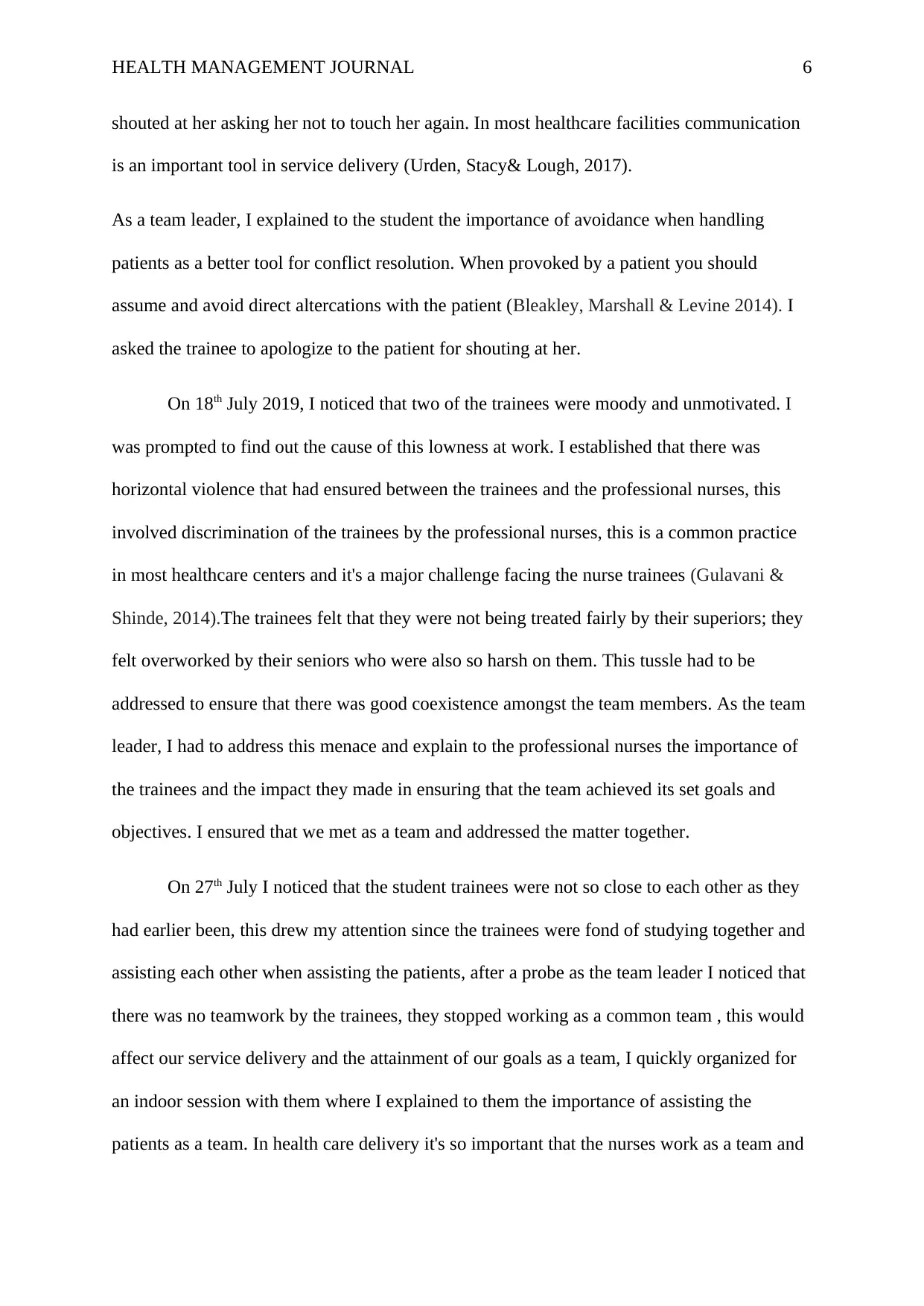
HEALTH MANAGEMENT JOURNAL 6
shouted at her asking her not to touch her again. In most healthcare facilities communication
is an important tool in service delivery (Urden, Stacy& Lough, 2017).
As a team leader, I explained to the student the importance of avoidance when handling
patients as a better tool for conflict resolution. When provoked by a patient you should
assume and avoid direct altercations with the patient (Bleakley, Marshall & Levine 2014). I
asked the trainee to apologize to the patient for shouting at her.
On 18th July 2019, I noticed that two of the trainees were moody and unmotivated. I
was prompted to find out the cause of this lowness at work. I established that there was
horizontal violence that had ensured between the trainees and the professional nurses, this
involved discrimination of the trainees by the professional nurses, this is a common practice
in most healthcare centers and it's a major challenge facing the nurse trainees (Gulavani &
Shinde, 2014).The trainees felt that they were not being treated fairly by their superiors; they
felt overworked by their seniors who were also so harsh on them. This tussle had to be
addressed to ensure that there was good coexistence amongst the team members. As the team
leader, I had to address this menace and explain to the professional nurses the importance of
the trainees and the impact they made in ensuring that the team achieved its set goals and
objectives. I ensured that we met as a team and addressed the matter together.
On 27th July I noticed that the student trainees were not so close to each other as they
had earlier been, this drew my attention since the trainees were fond of studying together and
assisting each other when assisting the patients, after a probe as the team leader I noticed that
there was no teamwork by the trainees, they stopped working as a common team , this would
affect our service delivery and the attainment of our goals as a team, I quickly organized for
an indoor session with them where I explained to them the importance of assisting the
patients as a team. In health care delivery it's so important that the nurses work as a team and
shouted at her asking her not to touch her again. In most healthcare facilities communication
is an important tool in service delivery (Urden, Stacy& Lough, 2017).
As a team leader, I explained to the student the importance of avoidance when handling
patients as a better tool for conflict resolution. When provoked by a patient you should
assume and avoid direct altercations with the patient (Bleakley, Marshall & Levine 2014). I
asked the trainee to apologize to the patient for shouting at her.
On 18th July 2019, I noticed that two of the trainees were moody and unmotivated. I
was prompted to find out the cause of this lowness at work. I established that there was
horizontal violence that had ensured between the trainees and the professional nurses, this
involved discrimination of the trainees by the professional nurses, this is a common practice
in most healthcare centers and it's a major challenge facing the nurse trainees (Gulavani &
Shinde, 2014).The trainees felt that they were not being treated fairly by their superiors; they
felt overworked by their seniors who were also so harsh on them. This tussle had to be
addressed to ensure that there was good coexistence amongst the team members. As the team
leader, I had to address this menace and explain to the professional nurses the importance of
the trainees and the impact they made in ensuring that the team achieved its set goals and
objectives. I ensured that we met as a team and addressed the matter together.
On 27th July I noticed that the student trainees were not so close to each other as they
had earlier been, this drew my attention since the trainees were fond of studying together and
assisting each other when assisting the patients, after a probe as the team leader I noticed that
there was no teamwork by the trainees, they stopped working as a common team , this would
affect our service delivery and the attainment of our goals as a team, I quickly organized for
an indoor session with them where I explained to them the importance of assisting the
patients as a team. In health care delivery it's so important that the nurses work as a team and
⊘ This is a preview!⊘
Do you want full access?
Subscribe today to unlock all pages.

Trusted by 1+ million students worldwide
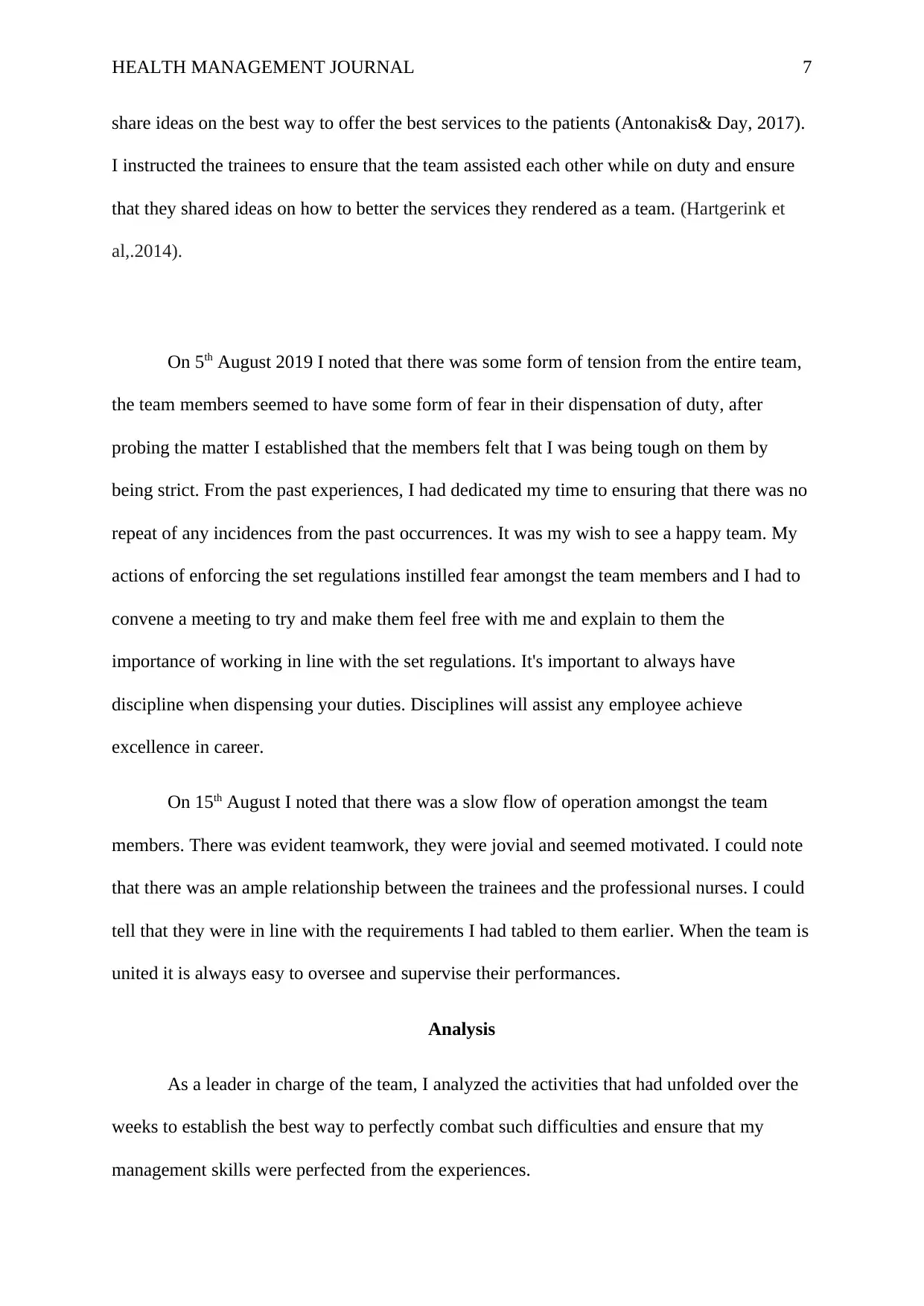
HEALTH MANAGEMENT JOURNAL 7
share ideas on the best way to offer the best services to the patients (Antonakis& Day, 2017).
I instructed the trainees to ensure that the team assisted each other while on duty and ensure
that they shared ideas on how to better the services they rendered as a team. (Hartgerink et
al,.2014).
On 5th August 2019 I noted that there was some form of tension from the entire team,
the team members seemed to have some form of fear in their dispensation of duty, after
probing the matter I established that the members felt that I was being tough on them by
being strict. From the past experiences, I had dedicated my time to ensuring that there was no
repeat of any incidences from the past occurrences. It was my wish to see a happy team. My
actions of enforcing the set regulations instilled fear amongst the team members and I had to
convene a meeting to try and make them feel free with me and explain to them the
importance of working in line with the set regulations. It's important to always have
discipline when dispensing your duties. Disciplines will assist any employee achieve
excellence in career.
On 15th August I noted that there was a slow flow of operation amongst the team
members. There was evident teamwork, they were jovial and seemed motivated. I could note
that there was an ample relationship between the trainees and the professional nurses. I could
tell that they were in line with the requirements I had tabled to them earlier. When the team is
united it is always easy to oversee and supervise their performances.
Analysis
As a leader in charge of the team, I analyzed the activities that had unfolded over the
weeks to establish the best way to perfectly combat such difficulties and ensure that my
management skills were perfected from the experiences.
share ideas on the best way to offer the best services to the patients (Antonakis& Day, 2017).
I instructed the trainees to ensure that the team assisted each other while on duty and ensure
that they shared ideas on how to better the services they rendered as a team. (Hartgerink et
al,.2014).
On 5th August 2019 I noted that there was some form of tension from the entire team,
the team members seemed to have some form of fear in their dispensation of duty, after
probing the matter I established that the members felt that I was being tough on them by
being strict. From the past experiences, I had dedicated my time to ensuring that there was no
repeat of any incidences from the past occurrences. It was my wish to see a happy team. My
actions of enforcing the set regulations instilled fear amongst the team members and I had to
convene a meeting to try and make them feel free with me and explain to them the
importance of working in line with the set regulations. It's important to always have
discipline when dispensing your duties. Disciplines will assist any employee achieve
excellence in career.
On 15th August I noted that there was a slow flow of operation amongst the team
members. There was evident teamwork, they were jovial and seemed motivated. I could note
that there was an ample relationship between the trainees and the professional nurses. I could
tell that they were in line with the requirements I had tabled to them earlier. When the team is
united it is always easy to oversee and supervise their performances.
Analysis
As a leader in charge of the team, I analyzed the activities that had unfolded over the
weeks to establish the best way to perfectly combat such difficulties and ensure that my
management skills were perfected from the experiences.
Paraphrase This Document
Need a fresh take? Get an instant paraphrase of this document with our AI Paraphraser
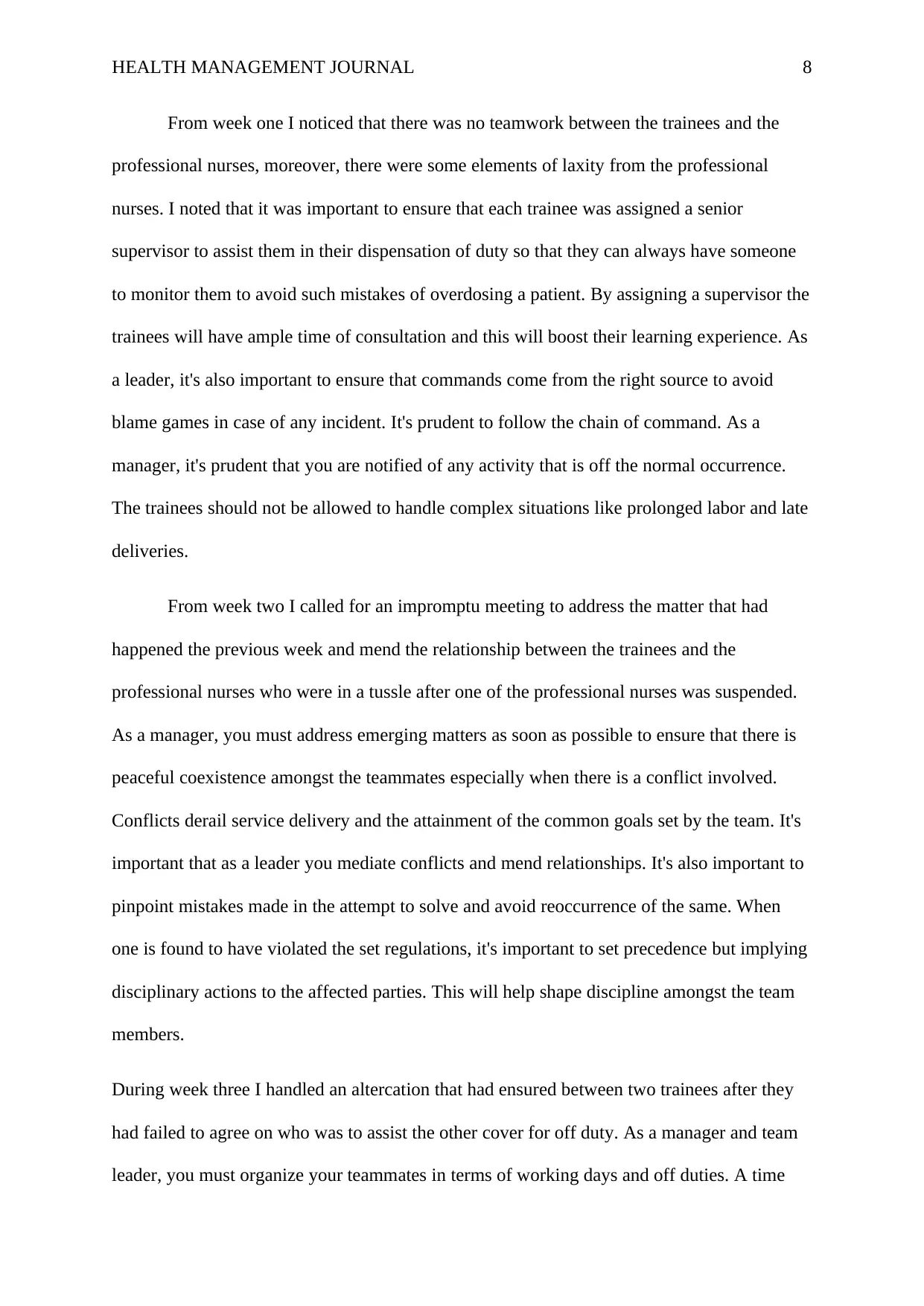
HEALTH MANAGEMENT JOURNAL 8
From week one I noticed that there was no teamwork between the trainees and the
professional nurses, moreover, there were some elements of laxity from the professional
nurses. I noted that it was important to ensure that each trainee was assigned a senior
supervisor to assist them in their dispensation of duty so that they can always have someone
to monitor them to avoid such mistakes of overdosing a patient. By assigning a supervisor the
trainees will have ample time of consultation and this will boost their learning experience. As
a leader, it's also important to ensure that commands come from the right source to avoid
blame games in case of any incident. It's prudent to follow the chain of command. As a
manager, it's prudent that you are notified of any activity that is off the normal occurrence.
The trainees should not be allowed to handle complex situations like prolonged labor and late
deliveries.
From week two I called for an impromptu meeting to address the matter that had
happened the previous week and mend the relationship between the trainees and the
professional nurses who were in a tussle after one of the professional nurses was suspended.
As a manager, you must address emerging matters as soon as possible to ensure that there is
peaceful coexistence amongst the teammates especially when there is a conflict involved.
Conflicts derail service delivery and the attainment of the common goals set by the team. It's
important that as a leader you mediate conflicts and mend relationships. It's also important to
pinpoint mistakes made in the attempt to solve and avoid reoccurrence of the same. When
one is found to have violated the set regulations, it's important to set precedence but implying
disciplinary actions to the affected parties. This will help shape discipline amongst the team
members.
During week three I handled an altercation that had ensured between two trainees after they
had failed to agree on who was to assist the other cover for off duty. As a manager and team
leader, you must organize your teammates in terms of working days and off duties. A time
From week one I noticed that there was no teamwork between the trainees and the
professional nurses, moreover, there were some elements of laxity from the professional
nurses. I noted that it was important to ensure that each trainee was assigned a senior
supervisor to assist them in their dispensation of duty so that they can always have someone
to monitor them to avoid such mistakes of overdosing a patient. By assigning a supervisor the
trainees will have ample time of consultation and this will boost their learning experience. As
a leader, it's also important to ensure that commands come from the right source to avoid
blame games in case of any incident. It's prudent to follow the chain of command. As a
manager, it's prudent that you are notified of any activity that is off the normal occurrence.
The trainees should not be allowed to handle complex situations like prolonged labor and late
deliveries.
From week two I called for an impromptu meeting to address the matter that had
happened the previous week and mend the relationship between the trainees and the
professional nurses who were in a tussle after one of the professional nurses was suspended.
As a manager, you must address emerging matters as soon as possible to ensure that there is
peaceful coexistence amongst the teammates especially when there is a conflict involved.
Conflicts derail service delivery and the attainment of the common goals set by the team. It's
important that as a leader you mediate conflicts and mend relationships. It's also important to
pinpoint mistakes made in the attempt to solve and avoid reoccurrence of the same. When
one is found to have violated the set regulations, it's important to set precedence but implying
disciplinary actions to the affected parties. This will help shape discipline amongst the team
members.
During week three I handled an altercation that had ensured between two trainees after they
had failed to agree on who was to assist the other cover for off duty. As a manager and team
leader, you must organize your teammates in terms of working days and off duties. A time
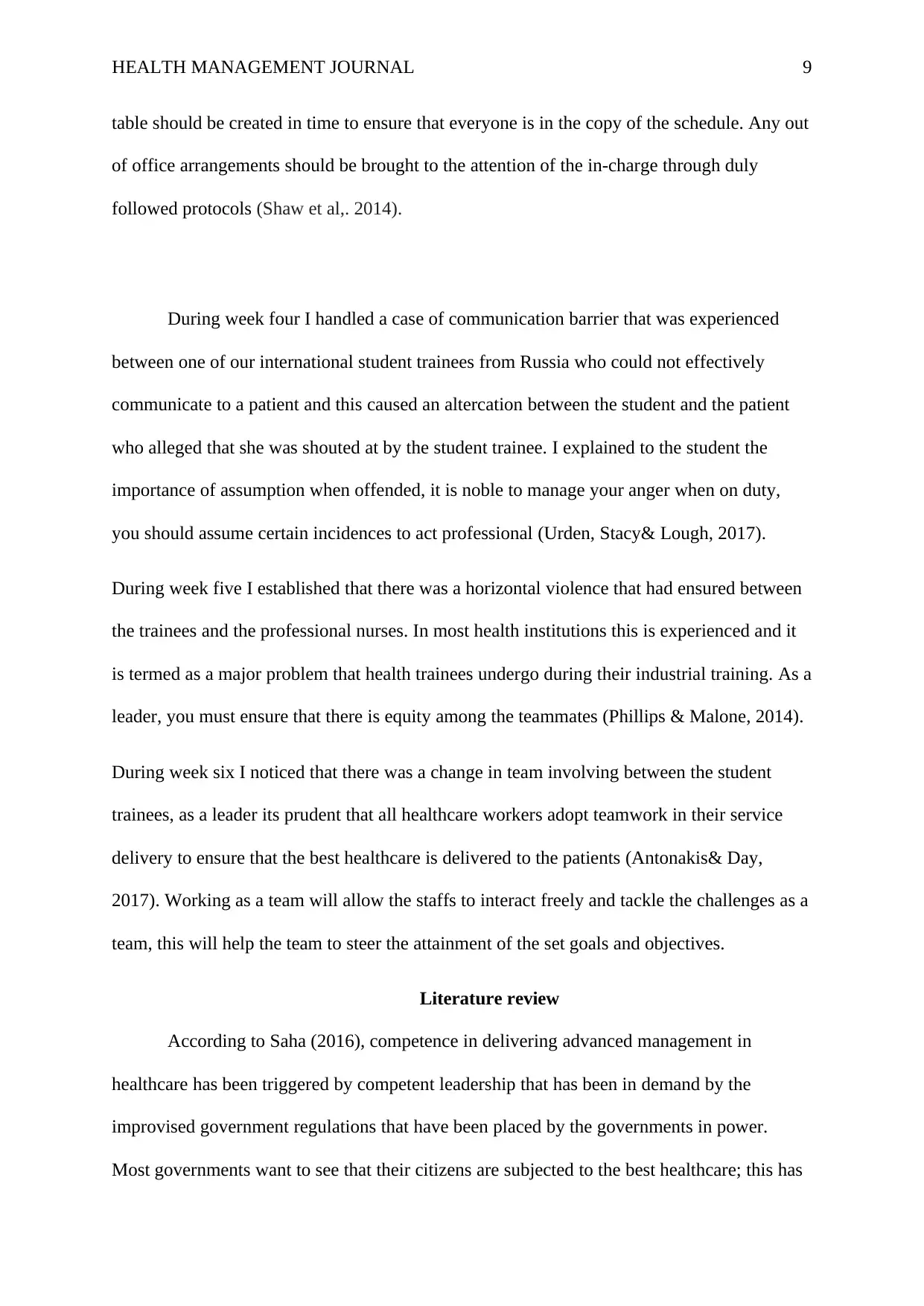
HEALTH MANAGEMENT JOURNAL 9
table should be created in time to ensure that everyone is in the copy of the schedule. Any out
of office arrangements should be brought to the attention of the in-charge through duly
followed protocols (Shaw et al,. 2014).
During week four I handled a case of communication barrier that was experienced
between one of our international student trainees from Russia who could not effectively
communicate to a patient and this caused an altercation between the student and the patient
who alleged that she was shouted at by the student trainee. I explained to the student the
importance of assumption when offended, it is noble to manage your anger when on duty,
you should assume certain incidences to act professional (Urden, Stacy& Lough, 2017).
During week five I established that there was a horizontal violence that had ensured between
the trainees and the professional nurses. In most health institutions this is experienced and it
is termed as a major problem that health trainees undergo during their industrial training. As a
leader, you must ensure that there is equity among the teammates (Phillips & Malone, 2014).
During week six I noticed that there was a change in team involving between the student
trainees, as a leader its prudent that all healthcare workers adopt teamwork in their service
delivery to ensure that the best healthcare is delivered to the patients (Antonakis& Day,
2017). Working as a team will allow the staffs to interact freely and tackle the challenges as a
team, this will help the team to steer the attainment of the set goals and objectives.
Literature review
According to Saha (2016), competence in delivering advanced management in
healthcare has been triggered by competent leadership that has been in demand by the
improvised government regulations that have been placed by the governments in power.
Most governments want to see that their citizens are subjected to the best healthcare; this has
table should be created in time to ensure that everyone is in the copy of the schedule. Any out
of office arrangements should be brought to the attention of the in-charge through duly
followed protocols (Shaw et al,. 2014).
During week four I handled a case of communication barrier that was experienced
between one of our international student trainees from Russia who could not effectively
communicate to a patient and this caused an altercation between the student and the patient
who alleged that she was shouted at by the student trainee. I explained to the student the
importance of assumption when offended, it is noble to manage your anger when on duty,
you should assume certain incidences to act professional (Urden, Stacy& Lough, 2017).
During week five I established that there was a horizontal violence that had ensured between
the trainees and the professional nurses. In most health institutions this is experienced and it
is termed as a major problem that health trainees undergo during their industrial training. As a
leader, you must ensure that there is equity among the teammates (Phillips & Malone, 2014).
During week six I noticed that there was a change in team involving between the student
trainees, as a leader its prudent that all healthcare workers adopt teamwork in their service
delivery to ensure that the best healthcare is delivered to the patients (Antonakis& Day,
2017). Working as a team will allow the staffs to interact freely and tackle the challenges as a
team, this will help the team to steer the attainment of the set goals and objectives.
Literature review
According to Saha (2016), competence in delivering advanced management in
healthcare has been triggered by competent leadership that has been in demand by the
improvised government regulations that have been placed by the governments in power.
Most governments want to see that their citizens are subjected to the best healthcare; this has
⊘ This is a preview!⊘
Do you want full access?
Subscribe today to unlock all pages.

Trusted by 1+ million students worldwide
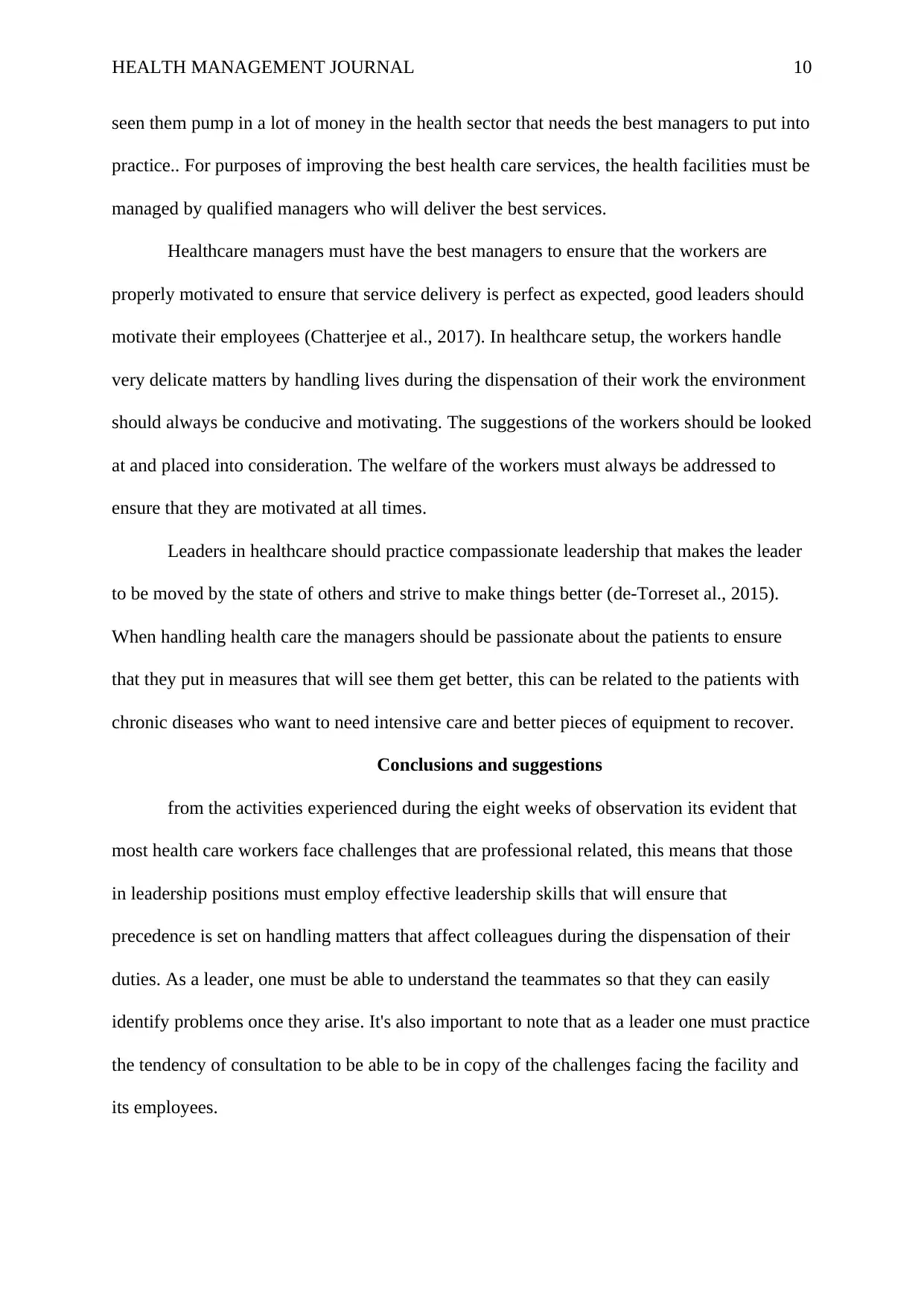
HEALTH MANAGEMENT JOURNAL 10
seen them pump in a lot of money in the health sector that needs the best managers to put into
practice.. For purposes of improving the best health care services, the health facilities must be
managed by qualified managers who will deliver the best services.
Healthcare managers must have the best managers to ensure that the workers are
properly motivated to ensure that service delivery is perfect as expected, good leaders should
motivate their employees (Chatterjee et al., 2017). In healthcare setup, the workers handle
very delicate matters by handling lives during the dispensation of their work the environment
should always be conducive and motivating. The suggestions of the workers should be looked
at and placed into consideration. The welfare of the workers must always be addressed to
ensure that they are motivated at all times.
Leaders in healthcare should practice compassionate leadership that makes the leader
to be moved by the state of others and strive to make things better (de-Torreset al., 2015).
When handling health care the managers should be passionate about the patients to ensure
that they put in measures that will see them get better, this can be related to the patients with
chronic diseases who want to need intensive care and better pieces of equipment to recover.
Conclusions and suggestions
from the activities experienced during the eight weeks of observation its evident that
most health care workers face challenges that are professional related, this means that those
in leadership positions must employ effective leadership skills that will ensure that
precedence is set on handling matters that affect colleagues during the dispensation of their
duties. As a leader, one must be able to understand the teammates so that they can easily
identify problems once they arise. It's also important to note that as a leader one must practice
the tendency of consultation to be able to be in copy of the challenges facing the facility and
its employees.
seen them pump in a lot of money in the health sector that needs the best managers to put into
practice.. For purposes of improving the best health care services, the health facilities must be
managed by qualified managers who will deliver the best services.
Healthcare managers must have the best managers to ensure that the workers are
properly motivated to ensure that service delivery is perfect as expected, good leaders should
motivate their employees (Chatterjee et al., 2017). In healthcare setup, the workers handle
very delicate matters by handling lives during the dispensation of their work the environment
should always be conducive and motivating. The suggestions of the workers should be looked
at and placed into consideration. The welfare of the workers must always be addressed to
ensure that they are motivated at all times.
Leaders in healthcare should practice compassionate leadership that makes the leader
to be moved by the state of others and strive to make things better (de-Torreset al., 2015).
When handling health care the managers should be passionate about the patients to ensure
that they put in measures that will see them get better, this can be related to the patients with
chronic diseases who want to need intensive care and better pieces of equipment to recover.
Conclusions and suggestions
from the activities experienced during the eight weeks of observation its evident that
most health care workers face challenges that are professional related, this means that those
in leadership positions must employ effective leadership skills that will ensure that
precedence is set on handling matters that affect colleagues during the dispensation of their
duties. As a leader, one must be able to understand the teammates so that they can easily
identify problems once they arise. It's also important to note that as a leader one must practice
the tendency of consultation to be able to be in copy of the challenges facing the facility and
its employees.
Paraphrase This Document
Need a fresh take? Get an instant paraphrase of this document with our AI Paraphraser
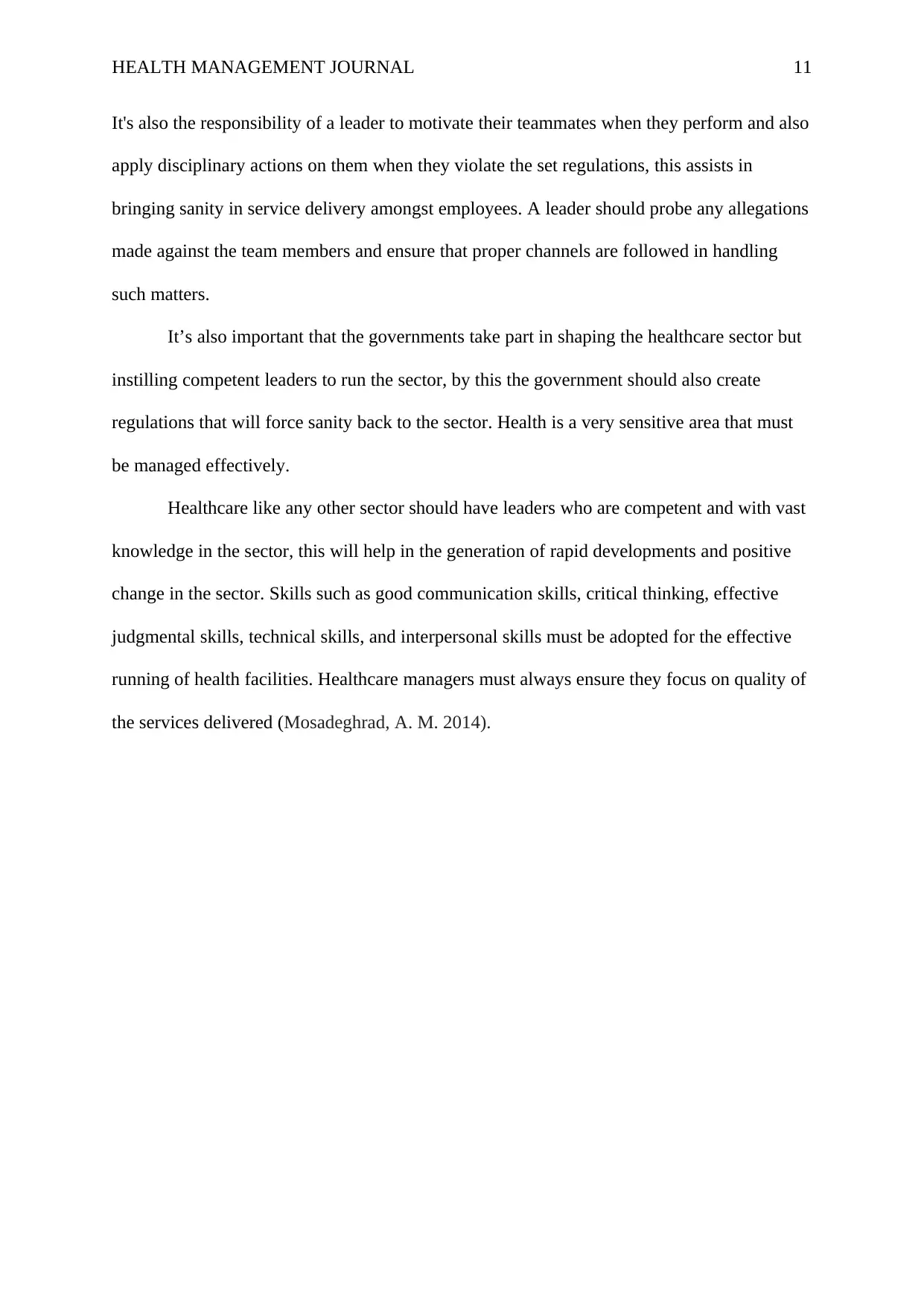
HEALTH MANAGEMENT JOURNAL 11
It's also the responsibility of a leader to motivate their teammates when they perform and also
apply disciplinary actions on them when they violate the set regulations, this assists in
bringing sanity in service delivery amongst employees. A leader should probe any allegations
made against the team members and ensure that proper channels are followed in handling
such matters.
It’s also important that the governments take part in shaping the healthcare sector but
instilling competent leaders to run the sector, by this the government should also create
regulations that will force sanity back to the sector. Health is a very sensitive area that must
be managed effectively.
Healthcare like any other sector should have leaders who are competent and with vast
knowledge in the sector, this will help in the generation of rapid developments and positive
change in the sector. Skills such as good communication skills, critical thinking, effective
judgmental skills, technical skills, and interpersonal skills must be adopted for the effective
running of health facilities. Healthcare managers must always ensure they focus on quality of
the services delivered (Mosadeghrad, A. M. 2014).
It's also the responsibility of a leader to motivate their teammates when they perform and also
apply disciplinary actions on them when they violate the set regulations, this assists in
bringing sanity in service delivery amongst employees. A leader should probe any allegations
made against the team members and ensure that proper channels are followed in handling
such matters.
It’s also important that the governments take part in shaping the healthcare sector but
instilling competent leaders to run the sector, by this the government should also create
regulations that will force sanity back to the sector. Health is a very sensitive area that must
be managed effectively.
Healthcare like any other sector should have leaders who are competent and with vast
knowledge in the sector, this will help in the generation of rapid developments and positive
change in the sector. Skills such as good communication skills, critical thinking, effective
judgmental skills, technical skills, and interpersonal skills must be adopted for the effective
running of health facilities. Healthcare managers must always ensure they focus on quality of
the services delivered (Mosadeghrad, A. M. 2014).
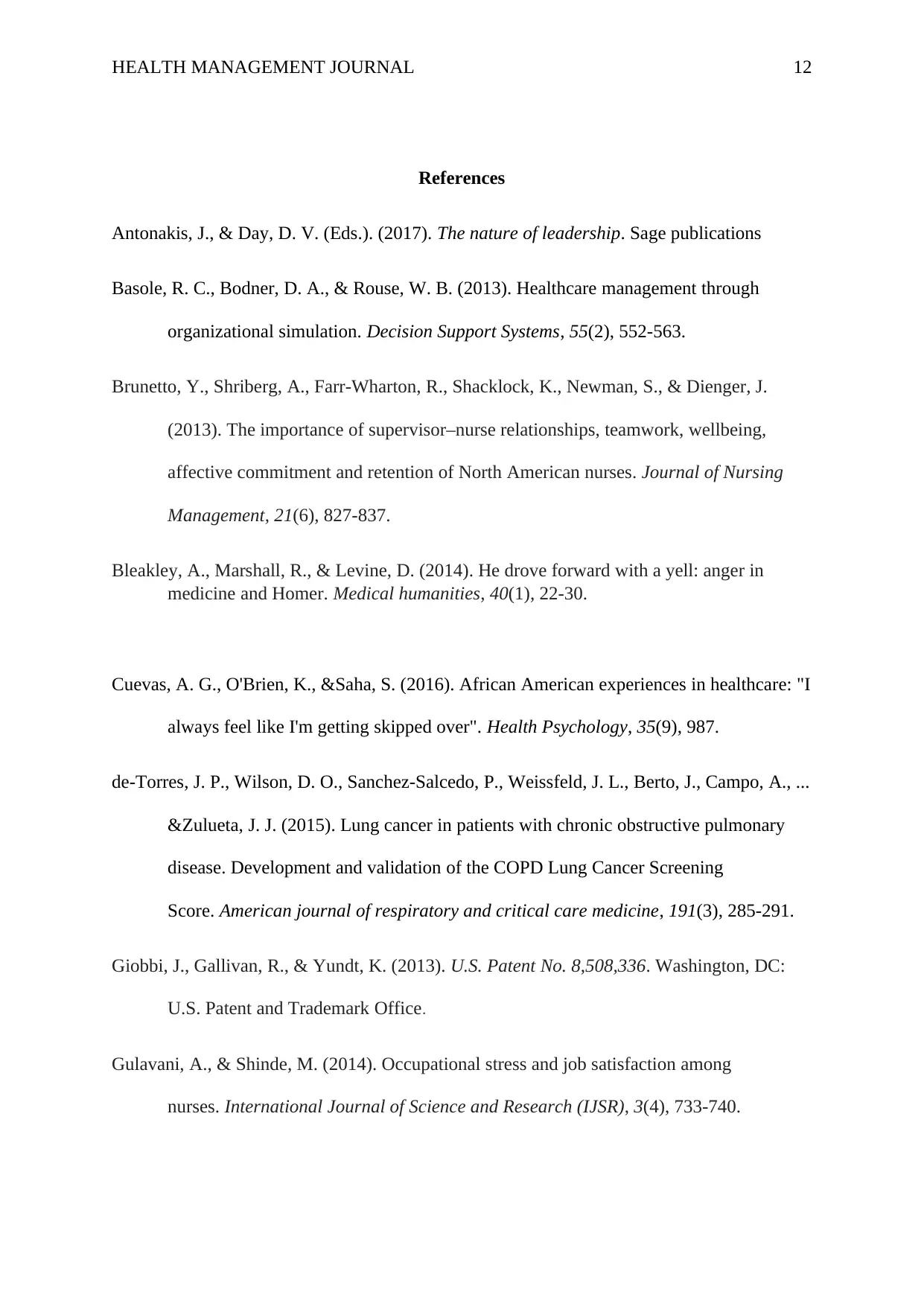
HEALTH MANAGEMENT JOURNAL 12
References
Antonakis, J., & Day, D. V. (Eds.). (2017). The nature of leadership. Sage publications
Basole, R. C., Bodner, D. A., & Rouse, W. B. (2013). Healthcare management through
organizational simulation. Decision Support Systems, 55(2), 552-563.
Brunetto, Y., Shriberg, A., Farr‐Wharton, R., Shacklock, K., Newman, S., & Dienger, J.
(2013). The importance of supervisor–nurse relationships, teamwork, wellbeing,
affective commitment and retention of North American nurses. Journal of Nursing
Management, 21(6), 827-837.
Bleakley, A., Marshall, R., & Levine, D. (2014). He drove forward with a yell: anger in
medicine and Homer. Medical humanities, 40(1), 22-30.
Cuevas, A. G., O'Brien, K., &Saha, S. (2016). African American experiences in healthcare: "I
always feel like I'm getting skipped over". Health Psychology, 35(9), 987.
de-Torres, J. P., Wilson, D. O., Sanchez-Salcedo, P., Weissfeld, J. L., Berto, J., Campo, A., ...
&Zulueta, J. J. (2015). Lung cancer in patients with chronic obstructive pulmonary
disease. Development and validation of the COPD Lung Cancer Screening
Score. American journal of respiratory and critical care medicine, 191(3), 285-291.
Giobbi, J., Gallivan, R., & Yundt, K. (2013). U.S. Patent No. 8,508,336. Washington, DC:
U.S. Patent and Trademark Office.
Gulavani, A., & Shinde, M. (2014). Occupational stress and job satisfaction among
nurses. International Journal of Science and Research (IJSR), 3(4), 733-740.
References
Antonakis, J., & Day, D. V. (Eds.). (2017). The nature of leadership. Sage publications
Basole, R. C., Bodner, D. A., & Rouse, W. B. (2013). Healthcare management through
organizational simulation. Decision Support Systems, 55(2), 552-563.
Brunetto, Y., Shriberg, A., Farr‐Wharton, R., Shacklock, K., Newman, S., & Dienger, J.
(2013). The importance of supervisor–nurse relationships, teamwork, wellbeing,
affective commitment and retention of North American nurses. Journal of Nursing
Management, 21(6), 827-837.
Bleakley, A., Marshall, R., & Levine, D. (2014). He drove forward with a yell: anger in
medicine and Homer. Medical humanities, 40(1), 22-30.
Cuevas, A. G., O'Brien, K., &Saha, S. (2016). African American experiences in healthcare: "I
always feel like I'm getting skipped over". Health Psychology, 35(9), 987.
de-Torres, J. P., Wilson, D. O., Sanchez-Salcedo, P., Weissfeld, J. L., Berto, J., Campo, A., ...
&Zulueta, J. J. (2015). Lung cancer in patients with chronic obstructive pulmonary
disease. Development and validation of the COPD Lung Cancer Screening
Score. American journal of respiratory and critical care medicine, 191(3), 285-291.
Giobbi, J., Gallivan, R., & Yundt, K. (2013). U.S. Patent No. 8,508,336. Washington, DC:
U.S. Patent and Trademark Office.
Gulavani, A., & Shinde, M. (2014). Occupational stress and job satisfaction among
nurses. International Journal of Science and Research (IJSR), 3(4), 733-740.
⊘ This is a preview!⊘
Do you want full access?
Subscribe today to unlock all pages.

Trusted by 1+ million students worldwide
1 out of 14
Related Documents
Your All-in-One AI-Powered Toolkit for Academic Success.
+13062052269
info@desklib.com
Available 24*7 on WhatsApp / Email
![[object Object]](/_next/static/media/star-bottom.7253800d.svg)
Unlock your academic potential
Copyright © 2020–2025 A2Z Services. All Rights Reserved. Developed and managed by ZUCOL.





